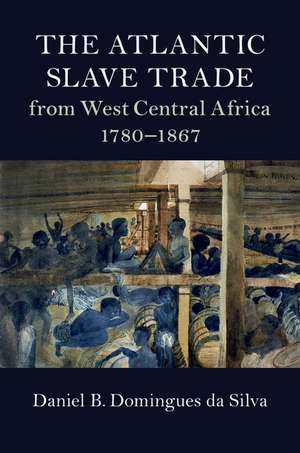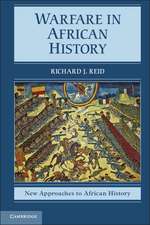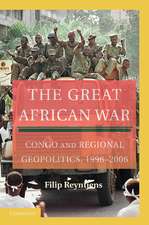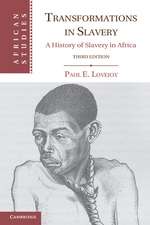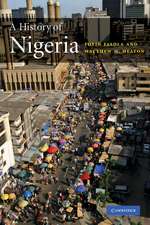The Atlantic Slave Trade from West Central Africa, 1780–1867: Cambridge Studies on the African Diaspora
Autor Daniel B. Domingues da Silvaen Limba Engleză Hardback – 25 iun 2017
| Toate formatele și edițiile | Preț | Express |
|---|---|---|
| Paperback (1) | 284.17 lei 6-8 săpt. | |
| Cambridge University Press – 22 mai 2019 | 284.17 lei 6-8 săpt. | |
| Hardback (1) | 693.18 lei 6-8 săpt. | |
| Cambridge University Press – 25 iun 2017 | 693.18 lei 6-8 săpt. |
Preț: 693.18 lei
Preț vechi: 778.85 lei
-11% Nou
Puncte Express: 1040
Preț estimativ în valută:
132.64€ • 138.48$ • 109.78£
132.64€ • 138.48$ • 109.78£
Carte tipărită la comandă
Livrare economică 04-18 aprilie
Preluare comenzi: 021 569.72.76
Specificații
ISBN-13: 9781107176263
ISBN-10: 1107176263
Pagini: 248
Dimensiuni: 158 x 235 x 20 mm
Greutate: 0.49 kg
Editura: Cambridge University Press
Colecția Cambridge University Press
Seria Cambridge Studies on the African Diaspora
Locul publicării:New York, United States
ISBN-10: 1107176263
Pagini: 248
Dimensiuni: 158 x 235 x 20 mm
Greutate: 0.49 kg
Editura: Cambridge University Press
Colecția Cambridge University Press
Seria Cambridge Studies on the African Diaspora
Locul publicării:New York, United States
Cuprins
List of figures; List of tables; Abbreviations; Acknowledgements; Introduction; 1. The Atlantic slave trade in the century of abolition; 2. The commercial organization of the slave trade; 3. The origins of slaves leaving West Central Africa; 4. The demographic profile of the enslaved population; 5. African patterns of consumption; 6. Experiences and methods of enslavement; Conclusion; Appendix A. Slave origins data; Appendix B. Slave prices data; Appendix C. Exchange commodities data; Bibliography; Index.
Recenzii
'Through the masterful application of quantitative methods, Domingues da Silva rewrites the history of the slave trade from West Central Africa. No longer do we have to guess at slaving patterns and at the demographic impact of those patterns on particular communities. Indeed, Domingues da Silva shows the value of carefully constructed databases for answering questions that have been debated time and time again.' Walter Hawthorne, Michigan State University
'Daniel B. Domingues da Silva's well-researched book is a welcome addition to the little-known history of the last decades of the slave trade from Angola. The author's research leaves no doubt that the main source of slaves during the period were the communities nearer the coast of Luanda and the Kwanza River, and not those in the far interior. This direct challenge to the existing scholarship will undoubtedly generate vigorous responses from the many scholars whose pioneering works made a direct connection between the expanding slave frontier and the powerful Lunda Empire.' Linda M. Heywood, Boston University, author of Njinga of Angola: Africa's Warrior Queen
'This is a valuable addition to the growing scholarship on the Angolan slave trade. While grounding his book on African dynamics and contexts, Domingues da Silva explores historical linkages with the wider Atlantic world. This book will immediately become a reference for scholars of the slave trade and abolition in the Atlantic world.' Roquinaldo Ferreira, Brown University, Rhode Island
'Daniel B. Domingues da Silva's well-researched book is a welcome addition to the little-known history of the last decades of the slave trade from Angola. The author's research leaves no doubt that the main source of slaves during the period were the communities nearer the coast of Luanda and the Kwanza River, and not those in the far interior. This direct challenge to the existing scholarship will undoubtedly generate vigorous responses from the many scholars whose pioneering works made a direct connection between the expanding slave frontier and the powerful Lunda Empire.' Linda M. Heywood, Boston University, author of Njinga of Angola: Africa's Warrior Queen
'This is a valuable addition to the growing scholarship on the Angolan slave trade. While grounding his book on African dynamics and contexts, Domingues da Silva explores historical linkages with the wider Atlantic world. This book will immediately become a reference for scholars of the slave trade and abolition in the Atlantic world.' Roquinaldo Ferreira, Brown University, Rhode Island
Notă biografică
Descriere
This book traces the inland origins of slaves leaving West Central Africa at the peak period of the transatlantic slave trade.
